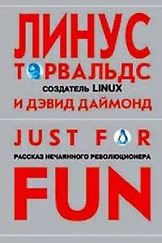It's the best illustration of the limitless benefits to be derived from the open source philosophy. While the PC wasn't developed using the open source model, it is an example of a technology that was opened for any person or company to clone and improve and sell. In its purest form, the open source model allows anyone to participate in a project's development or commercial exploitation. Linux is obviously the most successful example. What started out in my messy Helsinki bedroom has grown to become the largest collaborative project in the history of the world. It began as an ideology shared by software developers who believed that computer source code should be shared freely, with the General Public License -- the anticopyright -- as the movement's powerful tool. It evolved to became a method for the continuous development of the best technology. And it evolved further to gain widespread market acceptance, as seen in the snowballing adoption of Linux as an operating system for Web servers, and in its unexpectedly generous IPOs.
What was inspired by ideology has proved itself as technology and is working in the marketplace. Now open source is expanding beyond the technical and business domains. At Harvard University Law School, professors Larry Lessig (who is now at Stanford) and Charles Nesson have brought the open source model to law. They started the Open Law Project, which relies on volunteer lawyers and law students posting opinions and research to the project's Web site to help develop arguments and briefs challenging the United States Copyright Extension Act. The theory is that the strongest arguments will be developed when the largest number of legal minds are working on a project, and as a mountain of information is generated through postings and repostings. The site nicely sums up the tradeoff from the traditional approach: "What we lose in secrecy, we expect to regain in depth of sources and breadth of argument." (Put in another context: With a million eyes, all software bugs will vanish.)
It's a wrinkle on how academic research has been conducted for years, but one that makes sense on a number of fronts. Think of how this approach could speed up the development of cures for disease, for example. Or how, with the best minds on the task, international diplomacy could be strengthened. As the world becomes smaller, as the pace of life and business intensifies, and as the technology and information become available, people realize the tightfisted approach is becoming increasingly outmoded.
The theory behind open source is simple. In the case of an operating system, the source code -- the programming instructions underlying the system -- is free. Anyone can improve it, change it, exploit it. But those improvements, changes, and exploitations have to be made freely available. Think Zen. The project belongs to no one and to everyone. When a project is opened up, there is rapid and continual improvement. With teams of contributors working in parallel, the results can happen far more speedily and successfully than if the work were being conducted behind closed doors.
That's what we experienced with Linux. Imagine: Instead of a tiny cloistered development team working in secret, you have a monster on your side. Potentially millions of the brightest minds are contributing to a project, and are supported by a peer-review process that has no, er, peer.
The first time people hear about the open source approach, it sounds ludicrous. That's why it has taken years for the message of its virtues to sink in. Ideology isn't what has sold the open source model. It started gaining attention when it was obvious that open source was the best method of developing and improving the highest quality technology. And now it is winning in the marketplace, an accomplishment has brought open source its greatest acceptance. Companies were able to be created around numerous value-added services, or to use open source as a way of making a technology popular. When the money rolls in, people get convinced.
One of the least understood pieces of the open source puzzle is how so many good programmers would deign to work for absolutely no money. A word about motivation is in order. In a society where survival is more or less assured, money is not the greatest of motivators. It's been well established that folks do their best work when they are driven by a passion. When they are having fun. This is as true for playwrights and sculptors and entrepreneurs as it is for software engineers. The open source model gives people the opportunity to live their passion. To have fun. And to work with the world's best programmers, not the few who happen to be employed by their company. Open source developers strive to earn the esteem of their peers. That's got to be highly motivating.
It seems that Bill Gates doesn't understand this. Is it possible that he's now embarrassed by an off-putting rhetorical question he asked in 1976? "One thing you do is prevent good software from being written. Who can afford to do professional work for nothing?" he wrote in a letter to open source programmers.
In fact, one way to understand the open source phenomenon is to think about how science was perceived by religion so many centuries ago (if not today, by some creatures). Science was originally viewed as something dangerous, subversive, and antiestablishment -- basically how software companies sometimes view open source. And just as science wasn't born out of an effort to undermine the religious establishment, open source wasn't conceived in order to detonate the software establishment. It is there to produce the best technology, and to see where it goes.
Science on its own does not make money. It has been the secondary effects of science that create all the wealth. The same goes for open source. It allows the creation of secondary industries that challenge established businesses, much the way the spinoffs of science challenged the church. You find small companies like VA Linux taking advantage of open source and suddenly being able to compete with traditional corporations. In the words of Sir Isaac Newton, standing on the shoulders of giants.
And yes, as open source gains momentum in the world economy, and as its developers earn recognition, they are becoming increasingly bankable as employees. Companies search credit lists, which are traditionally appended to open source software contributions, to determine who is making multiple contributions. And then they instruct their human resources departments to deliver a wheelbarrow full of money and stock options to potential employees. In a previous paragraph I pronounced that money is not the greatest motivator, and, no, I haven't changed my mind in the ensuing sentences. But I must say that money isn't such a bad thing to have as a reward for hard work. It certainly is handy when it comes to filling up the gas tank in my BMW.
Like science itself, open source's secondary effects are endless. It is creating things that until recently were considered impossible, and opening up unexpected new markets. With Linux, as with other open source projects, companies can make their own versions and their own changes, which really isn't possible any other way. It's exciting to realize that just about everything that's ever been done with Linux was not remotely on the radar when we started. It is even taking off in China. Traditionally, software development in Asia has primarily been about translating American or European software. Now folks in that part of the world are using Linux to develop their own software. And I'm really proud of the guy who came up to me at Comdex and wanted to show me the gasoline pump that was running Linux. It was a prototype gasoline pump that was running Linux because he wanted to have Web browsers so gasoline customers could go to CNN.com during the three minutes they're waiting for their tanks to fill. Standing on the shoulders of giants.
Читать дальше












